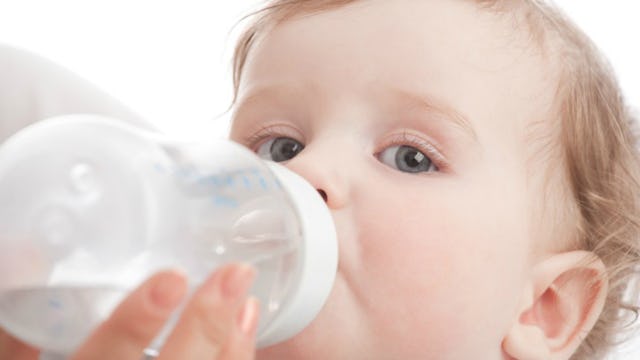Babies Shouldn’t Drink Water Until 6 Months, And Here's Why

One afternoon when my first baby had just turned five months old, we were out and about with my mom. It was summer, and the sun was blazing. Despite the fact that my mom knew my son was exclusively breastfed, she thought that he must be thirsty sitting there in the heat, and she started to get out her water bottle to offer him a few sips.
On instinct, I shouted “NO!” and snatched the water bottle out of her hands. I knew I’d heard somewhere that breastfed babies didn’t need additional water. I also knew my milk definitely had all the fluids he needed. My balloon-sized boobs and his soaking wet diapers (even in the summer heat) proved that. But was there something more to my instinctual reluctance to give him water?
RELATED: So, How Much Should A Newborn Actually Eat?
When I got home, I Googled my head off (don’t we all, when faced with questionable info pertaining to our children), where I found some good info that verified that my instincts had been absolutely correct.
Babies who aren’t eating solids yet should not be getting water supplements—and this is true for both breastfed and formula-fed babies. The milk that you feed them has all the nutrition and fluids they need for the first six months of life.
“Healthy babies do not need extra water,” writes the Academy of American Pediatrics. “Breast milk, formula, or both provide all the fluids they need.”
BOOM.
This advice is especially true for the littlest babies, whose systems aren’t meant to handle fluids other than milk. And for breastfed babies, giving supplements of any kind can interfere with milk production (remember: breastfeeding is a “supply and demand” system, so babies who are getting their milk from other sources will not demand breastmilk as frequently, which can lead to supply drops).
As the Academy of Breastfeeding Medicine describes it: “Supplementation in the first few days interferes with the normal frequency of breastfeedings. If the supplement is water or glucose water, the infant is at increased risk for increased bilirubin, excess weight loss, longer hospital stay, and potential water intoxication.”
YIKES.
But you need to be cautious with any baby under 4-6 months who hasn’t started solids yet. And although some doctors recommend offering water to formula-fed babies in hot weather, even that must be practiced in moderation.
The reason why? If given in large amounts, extra water can actually be dangerous for a baby.
Yep, it’s called “water intoxication.” And while it probably won’t happen if you offer your baby a small sip of water here or there, it is definitely something you need to practice caution with.
According to James P. Keating, MD, pediatrician and retired medical director of the St. Louis Children’s Hospital Diagnostic Center, for babies under one year (and most notably for any baby under nine months), drinking too much water can have dire consequences.
As Dr. Keating explains on the St. Louis Children’s Hospital’s website, excess water changes the balance of a baby’s sodium levels, which—in extreme circumstances—can lead to comas, seizures, brain damage, and even death.
Well, that’s only slightly completely terrifying.
Dr. Keating says that if you feel that you must give your baby additional water, it should be limited to two to three ounces at a time—and should only be offered after a baby has breastfed or had a bottle of formula.
And although some might find his next piece of advice kind of shocking, Dr. Keating even advices against having your baby participate in swimming lessons, for fear that they might swallow excess water.
“Repeated dunking of infants can cause them to gulp water and has caused seizures in the infants at the poolside,” says Dr. Keating.
Holy crap. That is something I never in a million years would have considered.
Of course, none of us need to take things to the extreme and keep our infants from every miniscule drop of water that might come near them. But I think it’s definitely good to know that this is an issue that we all need to become more aware of, and that we should take extra care to make sure our babies don’t ingest excessive amounts of water.
Once babies are old enough for solids, though, and milk isn’t their only food source anymore, experts recommend offering water (not juice!) with their meals. Although you want to introduce water slowly, and not in excess, water can aid in digestion. And as the months tick by and more solids are eaten, is important to replace fluids that are lost as the amount of breastmilk or formula your baby drinks gradually decreases.
But for the little ones? Breastmilk or formula are all your baby needs, even in hot weather.
So next time your baby’s grandma (ahem), or anyone else tries to shove a bottle of water down your baby’s throat, you can give them a firm “No thanks!” and be on your merry way. In those first six months or so, your baby doesn’t need any extra water. Really. And don’t let anyone tell you otherwise.
This article was originally published on